- Home
- Mack Reynolds
Equality: In the Year 2000 jw-2 Page 14
Equality: In the Year 2000 jw-2 Read online
Page 14
Julian sighed. “It was one of the big problems of my time.”
Edith said, “When drugs were first legalized and taken out of the hands of the criminals, they were given quite a go. Then, as with pornography in Denmark, and later in the States, particularly after an extensive educational campaign in the media, use fell off to the vanishing point. I tried smoking opium once, out of sheer curiosity.”
“You did? You don’t look the type. What happened?”
She was indignant. “But of course I’m the type. I keep telling you that I am an amateur anthropologist. Man has smoked, eaten, and drunk opium for thousands of years.”
“What happened to you?”
“The first time? It made me sick.”
“What do you mean, the first time? What happened the second time?”
“It wasn’t so bad. I had some very nice dreams. I had read up on it, so I knew I had a good chance of becoming ill the first few times I smoked. But I went on and saw it through.”
He shook his head. “It simply doesn’t seem like Edith Leete. Did you finally wind up taking the cure?”
“The cure?”
“For addiction.”
“Oh, Jule. Don’t be ridiculous. I didn’t become addicted. I simply tried it a few times and then stopped. It bored me.”
Julian said, “Okay. Let’s get back to crime. What I want to know is what the hell happened to the criminals when these changes of yours started taking place? What happened to the Mafia, the Syndicate, Cosa Nostra? What did you have to do, shoot them all?”
She rubbed a hand down over her face in a gesture of despair. “Jule, Jule.” Then, “The average criminal in any society is not an affluent man. For every Lucky Luciano—was that his name? It’s been years since I studied it.”
“Yes, Lucky,” Julian said. “As a matter of fact, I met him a couple of times in Naples. Well, it was Capri, actually, just off the coast. He was a rather quiet type. Quite a gentleman, in a way. But there was death behind his eyes.”
“Good heavens, how wonderful,” she said. “For me it’s history. It’s like your telling me you knew, well, Lincoln or General Grant or someone like that.”
Julian said, “My family began its fortune during the Grant administration. There were many opportunities, if you had the connections.”
She said, “At any rate, for every Luciano, Costello, or Capone, there were a thousand petty thieves, dope peddlers, counterfeiters, and so forth whose average take, over the years spent in crime, was less than that of a worker in industry, especially when one considers the years in prison. Let me see if I can remember his name… yes, Willy ‘The Actor’ Sutton, one of the most successful bank robbers. He once figured out that during the forty years in which he had been engaged in crime, or was imprisoned, he had averaged less than two thousand dollars a year in ‘take-home pay.’ Of course, deducted from his gross income were bribes to the police and crooked politicians, lawyers’ fees, exorbitant prices for hideouts, and other professional expenses.”
“What’s your point?”
“You asked what happened to the criminal element when our new Society of the Golden Rule emerged. Certainly, a few Godfathers of the Mafia and such well-to-do criminals opposed the new way of things as strongly as any capitalist. But the overwhelming majority of smaller fry were as much in support of the changes as their more law-abiding citizens.”
Julian slumped back, tossing his notes to the table once again.
“I don’t know,” he said. “I’ve been being very righteous all along here. But the fact of the matter is that when I was the head of West Enterprises, it sometimes became difficult to figure out where honesty ended and crime began. I’ve been hauled into court several times.”
She nodded. “Yes, I know, Jule. Remember, along with my father and mother, I have studied your life just about all my life. I probably know things about you that you don’t…”
He scowled at her. “What’s that supposed to mean?”
She got to her feet and walked over to one of her father’s bookshelves. “Father is one of the last of the book collectors. If he had his way, he’d have a thousand volumes rather than relying on the International Data Banks. Now, where in the devil is the one I want?”
He waited for her to find whatever it was she was looking for. Eventually, she returned.
“Ferdinand Lundberg,” she said.
“I’ll be damned. I know that name. Seems to me he was a professor at one of the big schools. He wrote a couple of muckraker books, as I recall. I don’t think I read them.”
“Yes,” she said grimly. “You with your talk of crime, darling. Listen to this:
“’Most offenses open to members of the upper socioeconomic class… were dealt with by special administrative tribunals. The offenses were mostly variants of fraud or conspiracy. When they were committed against the broad public they called for relatively light penalties, seldom prison terms. Verdicts against the offender were often carefully phrased so as to be non-stigmatic… Even when a member of the upper socioeconomic class was found guilty of a stigmatic crime and was about to be sentenced, there was a marked difference in the language of the judge. Often in the case of a culprit of the lower classes the judge administered a savage tongue-lashing, while the defendant hung his head and his family sobbed, terrorized. But when upper-class culprits had been convicted in criminal court of using the mails to defraud the general public, the judge… typically began by saying: “You are men of affairs, of experience, of refinement and culture, of excellent reputation and standing in the business and social world.” They were in fact, as the judicial process had just disclosed, criminals. This difference in attitude of judges is often pronounced. Severely reprehensive toward members of the lower classes, the judges become wistful, melancholy, or sadly philosophical when sentencing men of the upper class. (After all, they both come from the same class, may have gone to the same school, and may belong to the same clubs.)… Many members of the upper classes did commit offenses for which the government held them accountable. But in most cases special arrangements had been made to handle them with kid gloves and in many cases to administer by way of punishment a slap on the wrist.’”
Julian laughed.
Her eyes narrowed. “What’s funny?”
He rubbed a hand over his chin. “Nothing, really. It’s absolutely true. Actually, I didn’t usually even appear in court. My attorneys represented me. One of the judges I remember was in college with me. We used to call him Fartface.”
“Fartface?”
“One of those taboo four-letter words your father mentioned. At any rate, he was on the take and—”
“On the take?”
“Ummm… that is, he was susceptible to bribery if you handled it in a careful, civilized manner.”
“How in the world did you handle bribery in a careful, civilized manner?”
He looked at her, knowing she wouldn’t understand what he was going to say. “In this particular case I gave his daughter a wedding present… fifty thousand dollars.” He added absently, “Tax free, obviously. Fifty thousand dollars from my account in Switzerland, in thousand-dollar bills.”
She was wide-eyed. “What did you get in return?”
He considered, remembering back down over the years. “Actually, what was involved was one of the smaller countries in Central America.”
Edith was incredulous. “You mean you bought a whole country?”
He said wearily, “That isn’t the way it works. It’s very complicated and, in fact, I don’t know how it works. I had people who worked for me who knew how it works. That’s how we all operated: Hughes, Getty, all of us. We could hire brains; we didn’t have to have any.”
She said, “I can’t believe this.”
“I gave you the wrong idea. I didn’t buy a country. Who in the hell wants a country? You’d have to worry about schools, hospitals, all the rest of it. What I bought was… well, control of everything that was worth owning in the cou
ntry. The right to exploit it.” He added cynically, “Including the president and senate. Come to think of it, whether or not they were worth owning is moot.”
She regarded him coldly and said, “I think your actions were disgusting.”
He came to his feet.
“Yes, I know. Looking back on it, so do I.”
Chapter Thirteen
The Year 1949
The nightmare was not a new one. It was as vivid as any of the others, though not so upsetting as the war dreams.
The event which came back to him had taken place when he was about fifteen, a teenager. His parents had died in the racing crash only the year before, and his uncle, who had taken over the raising of the heir to the West Enterprises fortune, had suggested a world cruise to take his mind off the tragedy.
The luxury cruise ship had traveled east from New York, and the early weeks of the trip weren’t of particular interest to the young Julian. He had been to Europe many times, many times he had sailed in the Mediterranean. However, once they passed through the Suez Canal and entered the Red Sea, he was in new territory. From Aden, at that time as British as Gibraltar, they had taken off across the Arabian Sea for Bombay, their first Indian port.
He took one of the passenger launches from the ship to the harbor landing before the Gateway to India.
He sat in the bow looking at the harbor with its myriad strange-looking craft. He had never seen lateen sails before, let alone outriggers. The vessels were a study in contrasts, ranging from such ultra-modern ships as their own Scandinavian steamer, to Arab dhows. The guide who had accompanied them from the ship to show them the city, explained that the dhows sailed all the way from Africa, during the monsoon season, and had been doing so since before the days of the Roman Empire.
Julian was one of the first off the launch. As a result, he was the first to be accosted by the beggars. There were at least a dozen of them, barefoot, ragged, dirty; the women all had at least one child, usually naked. Julian winced, being a sensitive boy at this point in his life, but he hadn’t as yet changed any money and carried only traveller’s checks. He had never seem a grimier lot, all thin to the point of emaciation.
He made his way through them as best he could, by looking up at the massive edifice, the Gateway of India, a Victorian arch of stone. The guide was saying that it served as a place of reception on important ceremonial occasions.
Leaving the others, Julian made his way through the arch to the large square beyond. There were more beggars here, each more ragged and dirty than the last. He looked about and spotted what appeared to be a police officer: a tall, handsome man with a thick black beard which was gathered up in a little net, and a white turban. He was in uniform and carried a swagger stick. He wore an iron-handled knife at his belt and an iron bangle on his left wrist. Julian was to find out later that the man was a Sikh.
He approached and said, “I beg your pardon. Could you direct me to the Taj Mahal Hotel?”
The other touched his turban in an easygoing salute, and pointed. “That is the Taj, right over there, sir.”
It was only a few hundred yards away, and as Julian walked toward it he could see that it was a large building, undoubtedly built in the old Victorian days of the Empire. It reminded him of a Gothic British railway station. There were two turbaned men at the door. One of them opened it at Julian’s approach, bowing in servile fashion.
The reception hall beyond was as one might have expected from the exterior, and Julian could have been in one of the older London hotels had it not been for the fact that all of the employees wore white turbans and had very dark complexions.
He went to the desk, receiving another servile bow, and said, “I wish to see Edward Fitz-James.”
“Yes, sir. Sir Edward is not in his suite, sir. Only a few minutes ago I saw him ascend to the lounge on the second floor.” The clerk indicated a large, red-carpeted stairway.
“Thank you,” Julian said, evidently somewhat to the man’s surprise.
He ascended the stairs and found another turbaned Indian at its head. There seemed to be a multitude of employees in this hotel.
“Could you point out Edward Fitz-James to me, please?”
The other blinked at the please, bowed and said, “That is Sir Edward over there at the small table near the window, sahib.”
Sir Edward, yet. Julian hadn’t known the man he was seeking held a title. Fitz-James had once had business dealings with his father, and had become somewhat of a friend of the Wild Wests. Julian had been given an introduction by his uncle, who had evidently either written or cabled ahead, since Julian had received a radiogram arranging for a get-together.
Julian approached and asked politely, “Sir Edward Fitz-James?” The man who looked up at him stiffly was a stereotype of the bluff Britisher: possibly fifty-five, maybe thirty pounds overweight, too red in the face, with a toothbrush mustache. He wore white shorts to the knee, a white shirt, heavy walking shoes and white woolen socks almost up to the knee.
He stood up. “You must be Julian West, I wouldn’t wonder. Resemble your father a bit.” He put out a beefy hand to shake and said, “Do sit down, dear boy.”
“Thank you, sir,” Julian said, and took an overstuffed leather chair across from the Englishman.
Sir Edward said jovially, “I say, if you walked over from the gate, you must already be bloody hot. Terrible climate here, isn’t it? Do have a lime squash.”
Then Julian noticed that he had a tall glass before him, well frosted, which contained a slightly greenish beverage. He turned and snapped his fingers imperiously at the nearest Indian, who hurried over.
“Another lime squash,” Sir Edward commanded. “And put a move into it.”
“Yes, Sir Edward,” the man said and hurried away.
“Beggars are slow as turtles,” the Britisher commented in a voice loud enough to carry to the man and half the other waiters in the lounge. “You have to learn the drill here. Keep the niggers in their place, don’t you know?”
Julian couldn’t think of anything to say to that so he kept his peace. He found the other a bit on the overwhelming side.
“Read about your father and mother,” Sir Edward said. He puffed out his cheeks in what he probably thought was an expression of sympathy. “Bloody shame. Charming chap, your father. Mother a beautiful woman. One of the most vivacious women I’ve met, I wouldn’t wonder.”
“Thank you, sir. My uncle Albert said that you used to race with father, on the Riviera.”
“Jolly well told. Never forget the first time I saw him. Just brought in a Jaguar, a quarter mile ahead of his nearest opponent. I thought to meself, now there’s a sharp chap. Before the day was out we made friends.”
Julian’s lime squash had come. He lifted it up.
Sir Edward said, raising his own glass in a toast, “All the best, dear boy.”
What was the British toast? “Cheers, sir.” He tried the drink and found it to be possibly the best soft drink he’d ever had. It was something like lemonade, except that it had soda in it rather than water, and, of course, it was made with limes not lemons.
Sir Edward grimaced. “Could use a spot of gin. Bloody beggars have prohibition now. Damned nuisance.”
Julian said carefully, almost apologetically, “If you don’t like it here, sir, why do you remain?”
Sir Edward grunted his equivalent of a laugh. “No use mucking around with the answer to that, dear boy. This is where the action is, as you Yankees say. When the Indians gained their bloody independence, His Majesty’s governmental officials returned to England, don’t you know? But we British businessmen didn’t. We stayed on. In fact, there are more English in India today than during the days of the Raj.”
He looked at his watch. “But, I say, suppose we mosey along and see a bit of the town? Bit interesting for you, I wouldn’t wonder. First trip to India and all that rot.”
They left the hotel and started up Colaba Road. Even in this Europeanized area, Julian coul
dn’t help but note the teeming multitudes of Indians. He had never seen such diversity of colorful costume.
“Bloody mess of the bounders, eh?” the Englishman said. “Pushing half a billion in all. More than four million in Bombay alone, I shouldn’t wonder. Jolly well too many of them. I’d jolly well like to go through the countryside and sterilize every other male, don’t you know?”
Julian said, “I don’t think I’ve ever seen anything so crowded except Times Square on New Year’s Eve.”
They had turned up Mahatma Gandhi Road.
“Son of a bitch, as you Yankees say,” Sir Edward commented about Gandhi. “Caused us ever so much trouble, but I suppose you can’t hold it against a chap for trying to get his own way, now can you?”
“I suppose not,” Julian said. “They certainly do have a great many different styles of clothes, don’t they?”
The Englishman turned guide. “Way you can tell the bloody bounders apart,” he said. “’See that one over there? The better dressed one? That’s a Brahman.” He sneered. “The nigger equivalent of an aristocrat. They wear a sacred thread over one shoulder and have a mark of one of the Hindu gods chalked on their forehead, rising from the bridge of the nose like two thin white horns. That’s one of the marks of Vishnu, the Preserver. Ridiculous, isn’t it?”
“What kind is that one?”
“Moslem. You can usually tell them from a Hindu because they wear a black fur cap. She’s a Moslem too. They wear that enveloping chadar or burqa. Looks like an animated tent, don’t you think?”
Most of the women, other than the occasional European, wore what Julian knew was called a sari, but there were a double score of styles.
“That’s a Bengali,” Sir Edward said. “He’s wearing what they call the dhoti. All-purpose white garment. Sometimes it hangs almost to the ground like a sarong, or sometimes they tuck it up like that chap, like a loincloth. Sometimes the bounders wear a waistcoat with it, sometimes a shirt with the tails flopping outside. Silly-looking bunch of monkeys, don’t you think?”

 Happy Ending
Happy Ending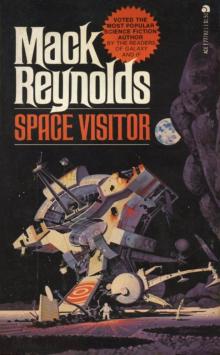 Space Visitor
Space Visitor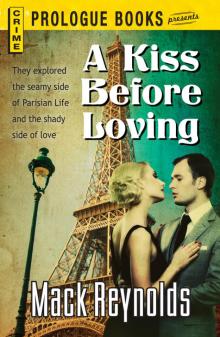 A Kiss Before Loving
A Kiss Before Loving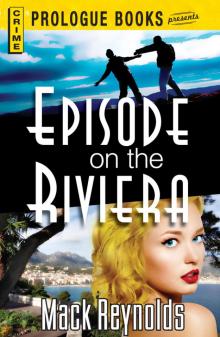 Episode on the Riviera
Episode on the Riviera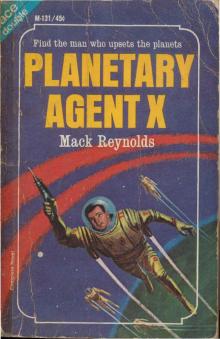 Planetary Agent X
Planetary Agent X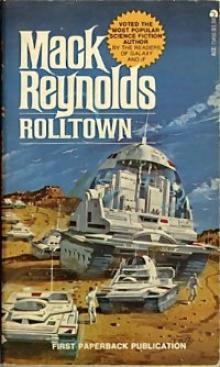 Rolltown bh-3
Rolltown bh-3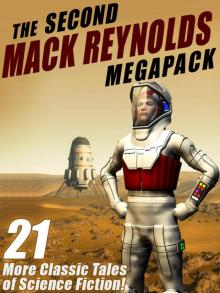 The Second Mack Reynolds Megapack
The Second Mack Reynolds Megapack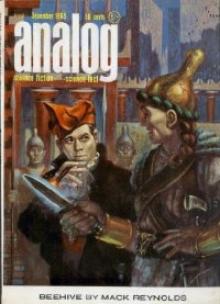 Dawnman Planet up-2
Dawnman Planet up-2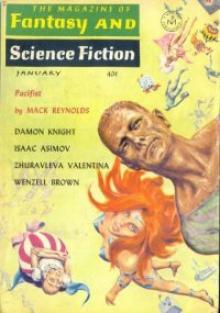 Pacifist
Pacifist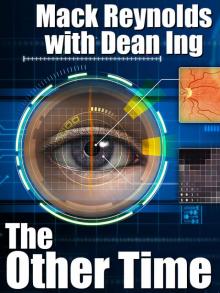 The Other Time
The Other Time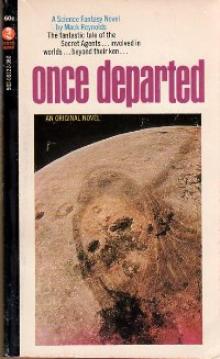 Once Departed
Once Departed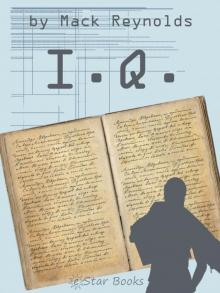 IQ
IQ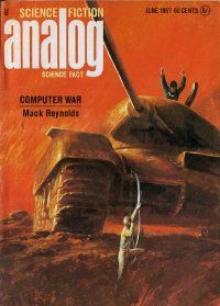 Computer War
Computer War Earth Unaware
Earth Unaware The Rival Rigelians up-3
The Rival Rigelians up-3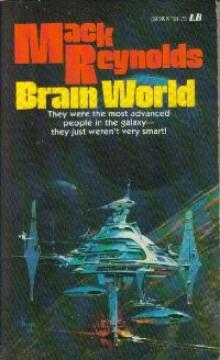 Brain World up-7
Brain World up-7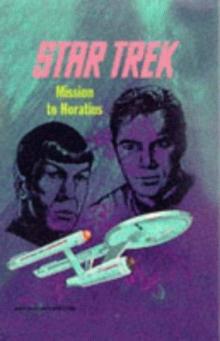 Star Trek - TOS - Mission to Horatius
Star Trek - TOS - Mission to Horatius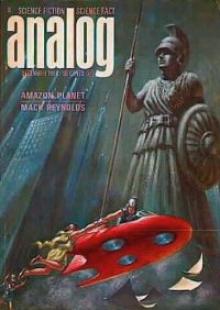 Amazon Planet up-5
Amazon Planet up-5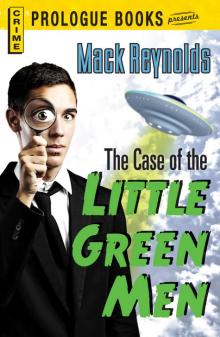 The Case of the Little Green Men
The Case of the Little Green Men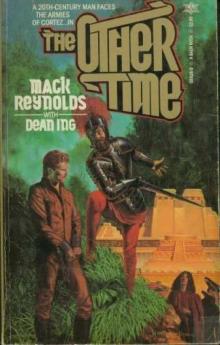 Other Time
Other Time The Mack Reynolds Megapack
The Mack Reynolds Megapack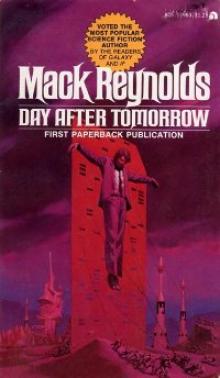 Day After Tomorrow
Day After Tomorrow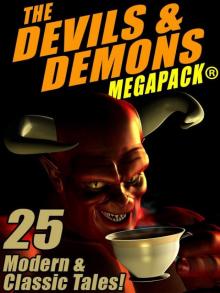 The Devils & Demons MEGAPACK ®: 25 Modern and Classic Tales
The Devils & Demons MEGAPACK ®: 25 Modern and Classic Tales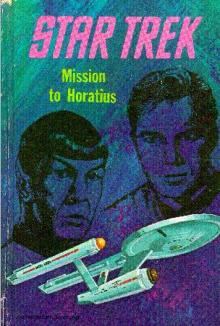 Mission to Horatius
Mission to Horatius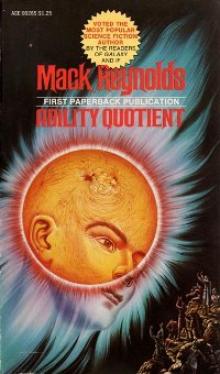 Ability Quotient
Ability Quotient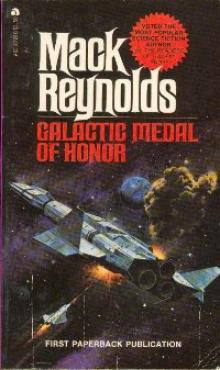 Galactic Medal of Honor
Galactic Medal of Honor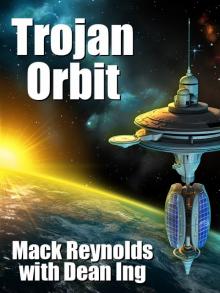 Trojan Orbit
Trojan Orbit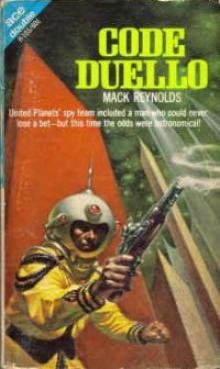 Code Duello up-4
Code Duello up-4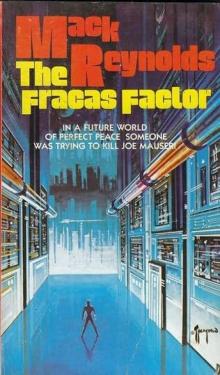 The Fracas Factor
The Fracas Factor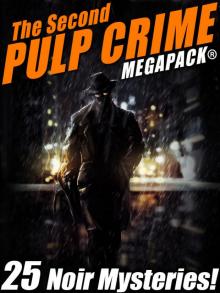 The Second Pulp Crime
The Second Pulp Crime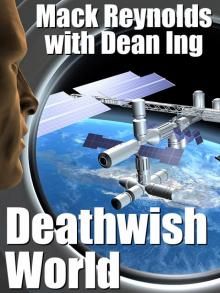 Deathwish World
Deathwish World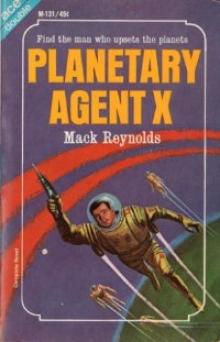 Planetary Agent X up-1
Planetary Agent X up-1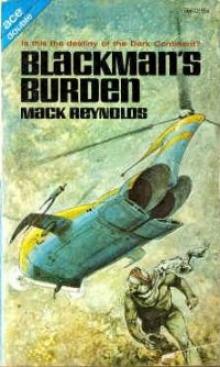 Blackman' Burden na-1
Blackman' Burden na-1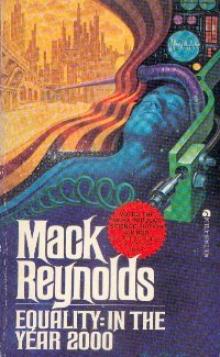 Equality: In the Year 2000 jw-2
Equality: In the Year 2000 jw-2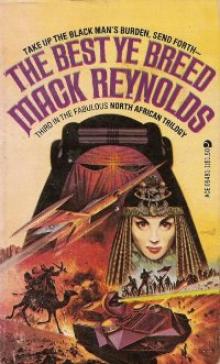 The Best Ye Breed na-3
The Best Ye Breed na-3 The Jet Set
The Jet Set The Rival Rigelians
The Rival Rigelians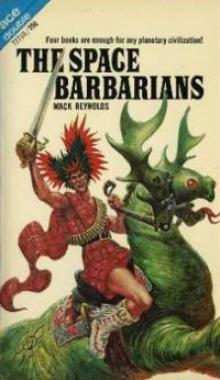 The Space Barbarians
The Space Barbarians